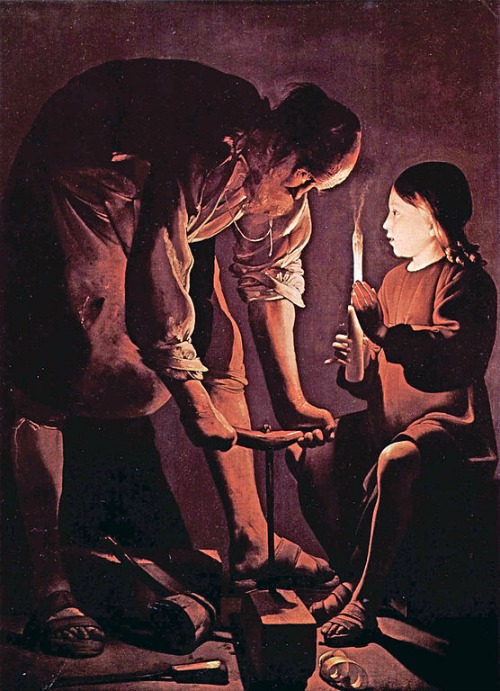St. Joseph, the Ultimate Action Hero
Honoring the masculine holiness of the Church’s universal patron on his feast day.

According to the latest box-office numbers, 13 of the top 20 grossing films of all time are what the industry calls “action movies.” Audiences obviously love them and have endorsed these films with billions of dollars’ worth of box-office receipts.
Usually these films are anchored by an actor who plays it straight as the strong silent type. These films are also populated by men armed with a slew of catch phrases, and their actions speak much louder than words. As I was reading the litany of popcorn movies that fit this bill, my mind wandered to an action hero of another sort: St. Joseph.
In honor of his March 19 feast day, I think he deserves to make some kind of top-10 list when it comes to patronage alone. He is the patron saint of carpenters, fathers, families, confectioners, pastry makers, workers, a holy death, a happy death and even real estate. Add to that the patron saint of 10 nations and the Church herself. Not a shabby résumé!
How did he come to be so revered by the Church?
Unlike so many other men and women of action in the Old and New Testaments, there is not a solitary word of his recorded by the Evangelists. He is mentioned by name in only two out of the four Gospels. Oh, there is plenty said to him, both by his betrothed and later his wife, Mary, and by an angel of the Lord — and then the Lord himself, no doubt — but Joseph’s responses were always actions, not words.
He protected Mary, though he was obviously upset at first by the God-planned events that transpired around her becoming the Mother of God. As the earthly father of Jesus, he took the family to Egypt to keep them safe, just as he was instructed to do.
What’s so different about this biblical action hero — and what sets him apart from the cliché-ridden and pop-culture examples on modern movie screens — is his quiet integrity and dedication to God’s will, which are often overlooked by the world.
Even the month set aside to pay him homage has been usurped by a Scottish-Roman saint with a penchant for the evangelization of Celts. So, as people conclude their St. Patrick Day’s festivities, the world needs a reminder of Joseph for March 19.
Granted, getting the Irish to sit still to hear the Gospel warrants esteem, but so does the care and feeding of the Blessed Mother and God’s own Son.
St. Joseph always seemed to be on the short end of the adulation stick. He certainly doesn’t get as much attention as he deserves — and that is because he represents something the glossy world of Hollywood and much of our culture runs from: masculine holiness.
Joseph didn’t possess the super powers of a spider, didn’t sweep the streets of Nazareth clean while wearing a cape or sail a pirate ship taking on the undead on the Sea of Galilee. He was just a run-of-the-mill carpenter.
But he lived his everyday life in a holy way. To borrow from another saint, Joseph certainly knew how to “preach” the Gospel every day and did so in a fashion that didn’t require words.
And besides the miraculous example of putting one’s life in the hands of God that Joseph bequeathed to us, and his stellar to-do list of responsibilities, Joseph’s life speaks uniquely to just about every man who ever lived or whoever will live.
I may be treading on dangerous ground here and securing my troglodyte card for ages to come, but we men like to think of ourselves in terms of what we have accomplished or the jobs we hold or the accolades we have received. We like to put diplomas, hunting trophies, photos of ourselves shaking hands with politicians and thank-you placards from Little League teams on our office walls to convince ourselves and others how accomplished we are.
There is a reason pro athletes, famous entrepreneurs and actors are paid enormous amounts of money to shill for products geared toward men. Deep down in our DNA, we men “connect” with these images.
St. Joseph didn’t get such honors. In terms of his worldly accomplishments, he didn’t start a company. There is no archeological evidence of a chain of carpentry shops called “Joe’s” to be found. And he wasn’t even around when Jesus entered into his public life.
He was not learned, he was not a man of means, and he did not possess gold or earthly power in any sufficient quantity to warrant interest from the passing crowd. If a first-century entrepreneur was looking for a celebrity to endorse his new wood plane, Joseph would not have been on the short list, I’m guessing. He was just too ordinary and too unaccomplished a guy in the eyes of the world.
But that doesn’t matter. God’s opinion is what counts.
In my status as an armchair theologian, I am continually amazed and awed by God’s symmetry.
In Adam and Eve, we have a man and woman who said “No” to God’s request. And in Mary and Joseph, we have a man and woman who said “Yes” to God and his plan for bringing the Savior of mankind into the world.
God’s approval and doing his will are what mattered to Joseph — a powerful lesson for us all — and that perspective makes him the world’s all-time action hero.
Robert Brennan writes from Los Angeles.










